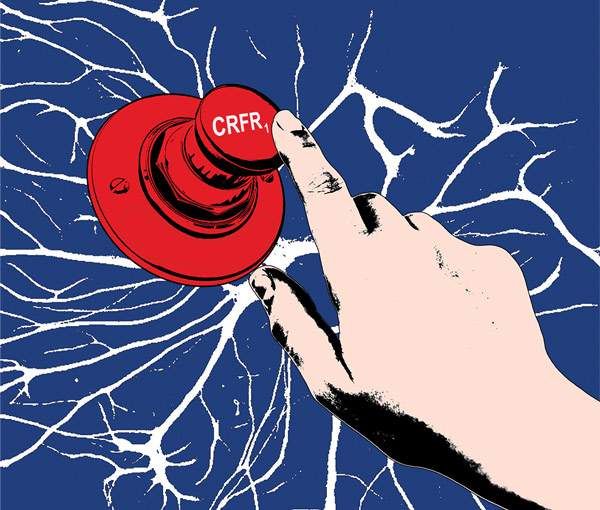Are you a journalist? Please sign up here for our press releases
Subscribe to our monthly newsletter:

In the face of stress, our body diverts metabolic resources to its emergency response. It has been thought that the sympathetic nervous system – the body’s instinctive system for reacting to stress – directs this activity, but Weizmann Institute of Science research now shows that neurons in the brain have a surprising role to play. The findings, which recently appeared in Cell Metabolism, may, in the future aid in developing better drugs for such stress-related pathologies as eating disorders.
Dr. Yael Kuperman began this study as part of her doctoral research in the lab of Prof. Alon Chen of the Neurobiology Department. Kuperman, presently a staff scientist in the Veterinary Resources Department, Chen and research student Meira Weiss focused on an area of the brain called the hypothalamus, which has a number of functions, among them helping the body adjust to stressful situations, controlling hunger and satiety, and regulating blood glucose and energy expenditure.
When stress hits, cells in the hypothalamus step up the activation of a receptor on their outer walls called CRFR1. It was known that this receptor contributes to the rapid activation of the sympathetic nerve network – increasing heart rate, for example. But since this area of the brain also regulates the body’s energy balance, the team thought that the CRFR1 receptor might play a role in this, as well.
We would instinctively expect the receptor to be expressed on the cells that suppress hunger
Chen and his group characterized the cells in a certain area of the hypothalamus, finding that the receptor is expressed in around half of those that arouse appetite and suppress energy expenditure. These cells comprise one of two main populations in the hypothalamus – the second promotes satiety and burning energy. “This was a bit of a surprise,” says Kuperman, “as we would instinctively expect the receptor to be expressed on the cells that suppress hunger.”
To continue investigating, the researchers removed the CRFR1 receptor just from the cells that arouse appetite in the hypothalamus, in lab mice, and then observed how this affected their bodily functions. At first, they did not see any significant changes, confirming that this receptor is saved for stressful situations. When they exposed the mice to stress – cold or hunger – they got another surprise.
When exposed to cold, the sympathetic nervous system activates a unique type of fat called brown fat, which produces heat to maintain the body’s internal temperature. When the receptor in the brain was removed, body temperature dropped dramatically – but only in the female mice. Even afterward their temperatures failed to stabilize, while male mice showed hardly any change.
Fasting produced a similarly drastic response in the female mice. Normally when food is scarce, the brain sends a message to the liver to produce glucose, conserving a minimum level in the blood. But when food was withheld from female mice missing the CRFR1 receptor, the amount of glucose their livers produced dropped significantly. In hungry male CRFR1-deficient mice, like those exposed to cold, the metabolism was barely affected.
“We discovered that the receptor has an inhibitory effect on the nerve cells, and this is what activates the sympathetic nervous system,” says Kuperman.
Among other things – revealing exactly how this receptor works and how it contributes to the stress response – the findings show that male and female bodies may exhibit significant differences in their metabolic response to stressful challenges. Indeed, the fact that the receptor is known to suppress eating may help explain why women are much more prone to eating disorders than men.
These findings could aid in developing psycho-pharmaceutical treatments, especially since drugs can enter the hypothalamus with relative ease. Indeed, several pharmaceutical companies have already begun developing drugs to block the CRFR1 receptor for the possible treatment of anxiety disorders or depression. The scientists caution, however, that because the cells are involved in energy balance, blocking the receptor could turn out to have such side effects as weight gain.
Prof. Alon Chen's research is supported by the Henry Chanoch Krenter Institute for Biomedical Imaging and Genomics; the Perlman Family Foundation, Founded by Louis L. and Anita M. Perlman; the Adelis Foundation; the Irving I Moskowitz Foundation; the European Research Council; the estate of Toby Bieber; and the Ruhman Family Laboratory for Research in the Neurobiology of Stress.
Dr. Yael Kuperman's research is supported by the Laboratory in honor of Sarah and Rolando Uziel, Mexico. Dr. Kuperman is the incumbent of the Sarah and Rolando Uziel Research Associate Chair.